Notes on Marriage
A photo essay
(Note to email readers: this is best read on the website because of photo size. To view it this way, click on the post title above.)
Since moving to Europe—and especially coming to Luxembourg in the Ardennes—I’ve found I’ve needed to confront some silly ideas about tradition which accumulated in my head during my life as an American leftist.
I’ve written quite often about that already, but never directly. And also, I recently promised you, my dear readers, some photos of my wedding. So here they are, along with some reflections about how my understanding of the world and of societal rituals has changed.
The man you see pouring the champagne is my husband, Ralph Waltmans. We met over 2 years ago at a bar in a medieval alley of Luxembourg city. He’s the Cultural Director of the second largest city here, and he’d just come from work dressed in a suit and wearing an Italian-designed woolen overcoat. I, on the other hand, wore Doc Marten boots, cargo pants from H&M, and a bomber jacket. Had you seen us later on the street walking together you’d have laughed. We did.
And that’s me, wearing the second suit I’ve ever owned in my life. The first I bought last year for the wedding of a friend. I’m new to suits, or they’re new to me.
I think quite often on how I might have explained all this to an earlier version of myself, how I would later become “okay” with wearing or eating things I once saw as symbols of oppression or signifiers of exploitative society. I mean, I even wear deodorant now, something I refused off all my 20’s and 30’s. What would I say to him, I mean to me?
I’d remind him of that dream he had during the deepest depression of his life.
That car above? That’s a Bentley, one that cost around a quarter of a million euros. Lent to us by the father of one of my husband’s closest friends, it arrived to pick us up from our house to the town hall where we married. It meant a lot that people arranged this for us even though I know nothing about cars. I’ve still never driven one nor do I know how to, but riding a bike in a suit isn’t precisely easy.
That dream, though. I was 25, I think, and used to fall into endless voids of depression and despair. One such time, when I became quite suicidal, I had a bizarrely vivid dream where I was riding in a convertible with someone else in Europe, and I got out of the car to tell myself very briefly, “hey, everything is really good later on…hang on, okay?”
I cried the entire short drive to the town hall, those kinds of tears that choke into laughter. We passed the forests full of deer and boars to whom I say hello whenever I see them, the streams I greet whenever I cross them, and though impossible really to describe, I heard them all telling me they were happy for me, too.
As in many other countries in Europe, marriage can only be performed by government officials. It’s quite common to then have a religious wedding afterwards to get the church’s blessing of it, but of course we’re not part of that religion.
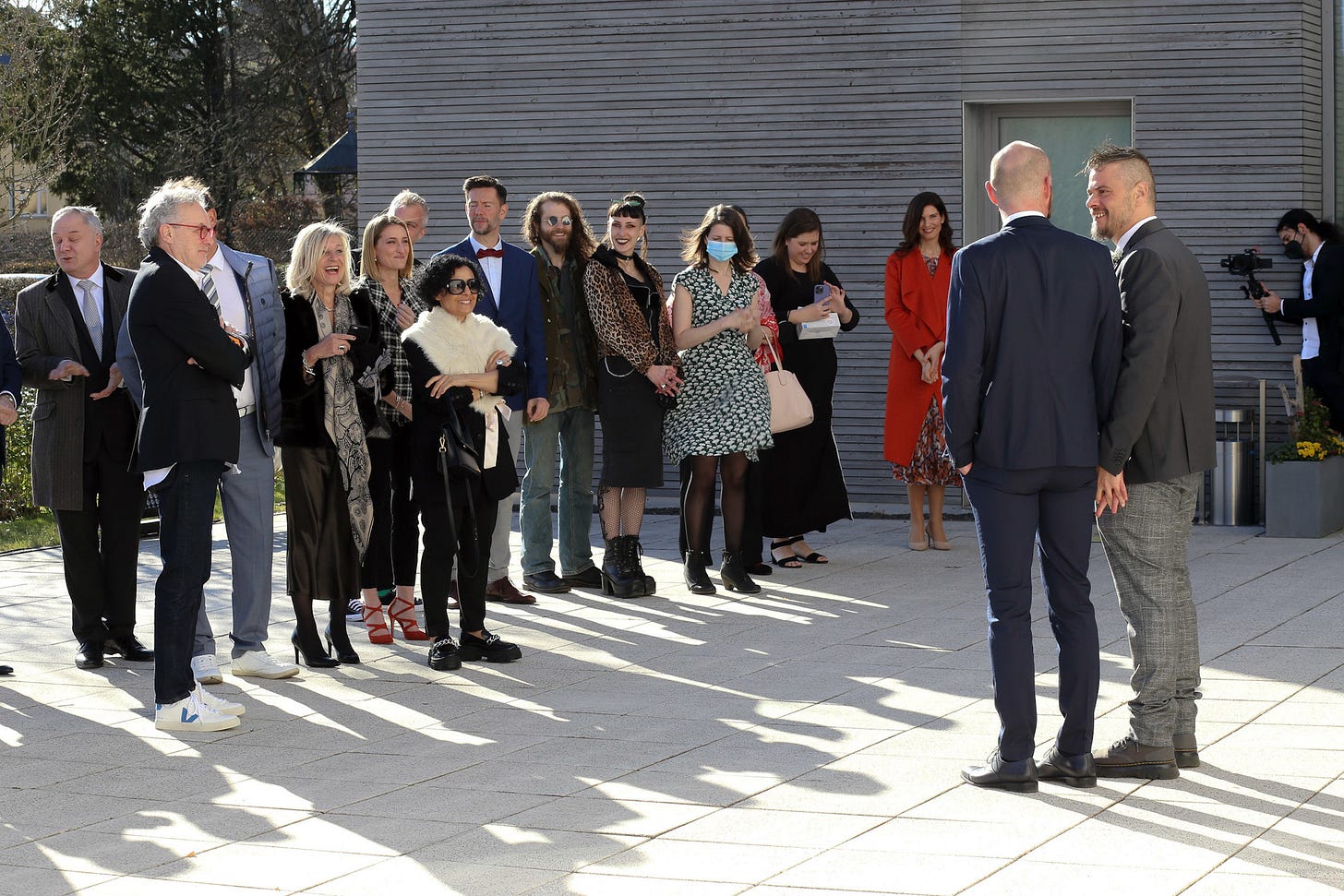
Leftists—and especially anarchists—tend to rail heavily against the “institution of marriage,” dismissing it as either a mere property arrangement or an outdated patriarchal form. This is usually founded upon inaccurate histories of marriage, a belief that the aristocratic form that came to predominate just before the Protestant Reformation was the only real form. In this narrative, peasants and the poor in general cared nothing for marriage and rather had it imposed upon them by their religious and secular rulers.
The more accurate account, however, is that marriage is a cultural universal which rather than being imposed instead became a site of political struggle. In fact, in pre-Carolingian and early medieval Europe, marriage wasn’t thought to require a priest at all, only the community as witness. Later the Catholic Church began to assert their necessity as authenticators of valid weddings, which allowed them to control who married and who could not.
More so, it was the Protestants who then tied marriage to the state. Their goal was to undermine the influence of the Catholics by requiring secular sanction instead. Since they often controlled the urban centers of that secular authority, the Protestants could then gain authority over who married and thus undermine the Catholic authority.
All the arguments now about whether marriage should be abolished or jettisoned as the legacy of an archaic system of property relations are responses to this last historical shift, the Protestant one. As with many leftists, and especially with those deeply caught up in Woke Ideology, there’s little attempt to imagine what came before these political changes. In these frameworks, all the past is primitive, and the future is the only place to live.
What’s missed in these views is the human experience itself. The problem is that—as with suits and expensive cars—we see only the symbols and signifiers and fail to notice the real beneath our narrative overlays.
Why would a person want to commit to another person in public? Why would a community want to celebrate such a thing? And why have humans in completely different contexts and lands done some form of this ritual for thousands of years?
The common conservative defense of marriage gets closer than the leftist critiques of it, but it’s still inadequate. Often we hear about children and social stability, about communities having a obligation to ensure the continuation of monogamy for the survival of the people. Again, though, these still only respond to the Protestant shift, not the older forms which have existed in all cultures.
Anyone who has been married probably can relate to everything I’ll describe of my own experience. If you haven’t or don’t think it’s an important thing, that’s fine of course, but maybe my narration will at least help you understand why so many people—regardless of our “enlightened” modern situation—regardless hold sacred the idea of marriage.
Both my husband and I cried in exactly the way brides are depicted as doing in films. I cried a bit more towards the beginning, he cried especially during the reception. For both of us, it was the faces of the others, their gestures of kindness and expressions of pleasure and happiness, that triggered the tears.
Seeing on the faces of everyone around you a reflection of the joy you feel being in love, a joy even a writer like myself never dares try to describe, gives you something you cannot do on your own. You cannot find context for love, nor the words for it. Not just for the emotion of love, but all the other parts no love song can even hint at: the feeling of home when you listen to your lover’s breathing on your chest, the warmth of a voice so familiar yet so different from your own, the comfortable yet otherworldly sense that another understands your heart and body and their movements in a way only dancers ever otherwise begin to understand. That feeling of ‘rightness,’ that the world and all within it is in perfect order when you hear him arrive home from work, or when you cook together. That strange and terrible passion which overcomes you, the desire to shake the earth from its foundations and pull the stars from the heavens when he is ill or sad and you wish to make it all better.
When the people gather around you, smiling, crying, laughing, or just looking kindly in your direction on that day, you know suddenly that love is maybe the only universal human experience and you no longer need to struggle to explain it. It just is, just as you and he are, and everyone is celebrating that together.
That’s why we humans do this. Whether or not the state or religious authorities should be involved is secondary to the sacred community ritual we all hit on thousands of years ago. Questions of class and property relations, or who can and cannot get married, or matters of monogamy and children each have been answered in often completely different ways throughout varying cultures.
Marriage is not inherently patriarchal, though it definitely became that in Protestant Europe. Wives in pre-Christian Nordic and Germanic lands often had much more authority and power than wives in Roman and Christianized Europe. In pre-Judaic Hebrew peoples, as with many nomadic African cultures, wives often had their own separate tents and property from their husbands. Polyandry (a woman with multiple husbands) existed in many older Celtic lands, as in some indigenous Asian peoples.
Gay marriage was extremely rare as far as any historical accounts I can find, but then homosexuality as it is formulated now is peculiarly modern. A man marrying a woman and keeping male lovers is still a common—but unadvertised—form of relations in Turkey and Arabian societies, just as it was for the aristocracy in Europe. What the peasants did, however, isn’t well recorded except in the legacy of sailors and pirates who held marriages on ships far from shore, just as during Carnival many ‘farce’ weddings between men were performed. In this latter case, it’s not difficult to imagine they were only billed as farcical to pass the Church and State censors, just as the many pagan rites continuously practiced slipped the notice of authorities because the gods were called ‘saints.’
It was absolutely the happiest day of my life, happier than I ever dared imagine possible, for all the reasons I’ve described already and one more. The sense of being part of something continuous, of something universally human, and especially the sense of stepping out of the mundane modern world into something historic and eternal—essentially, the sacred—cannot really be described, only lived.
In the days following, my husband and I kept looking at each other and smiled. We’d also laugh, and cry, and shake our heads in wonder at what had just occurred. We’d celebrated until very late that night, or very early the next morning. A wedding ceremony, then a reception, followed by an afterparty at our house.
At the reception, our friends had conspired in the most brilliant of ways, organising themselves into a chorus to sing for us. One of my sisters, who took most of these photos, caught the moment my husband suddenly realized what they’d all done:
One of the reasons I love this man is he’s brilliant at engineering surprises and beautiful experiences for others. Standing next to him as he realized people he loved and had done such things for had just outdone him was maybe my favorite moment of the night.
There are of course countless other reasons why I love him, and why we married, and why it was the most incredible experience I’ve ever had. But again, love resists explanation and narration in the best of ways, like all else that makes us most human and most beautiful.



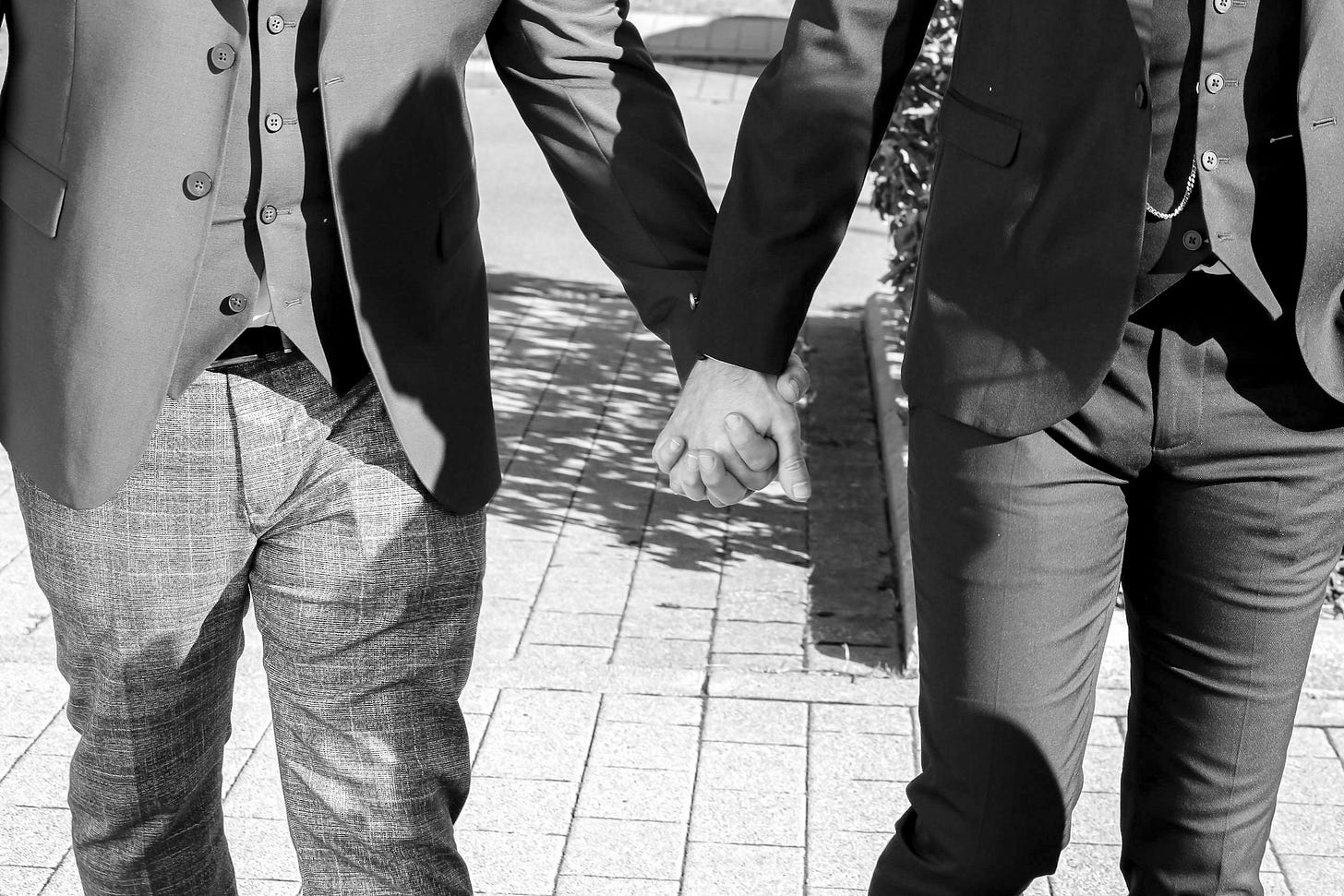
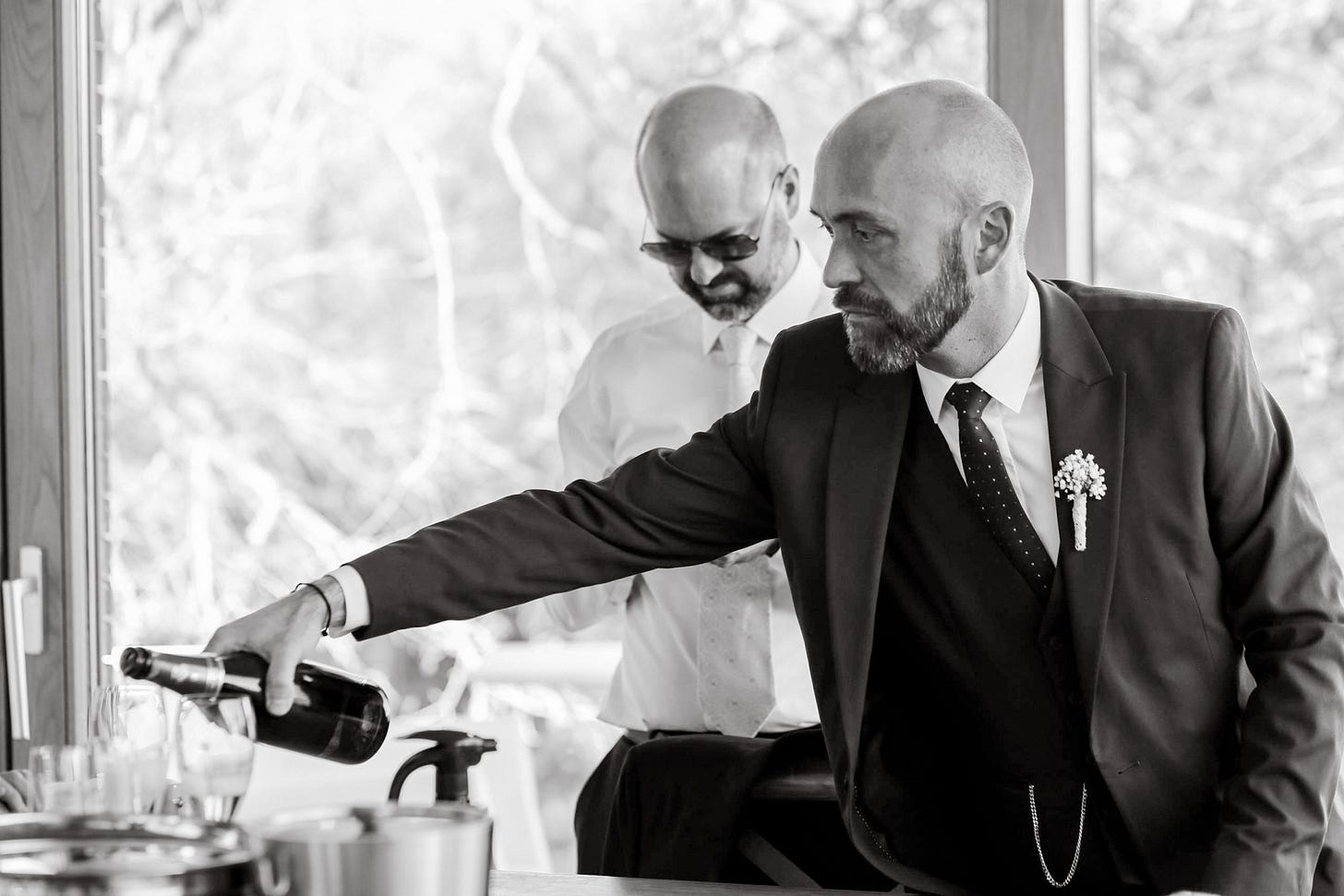
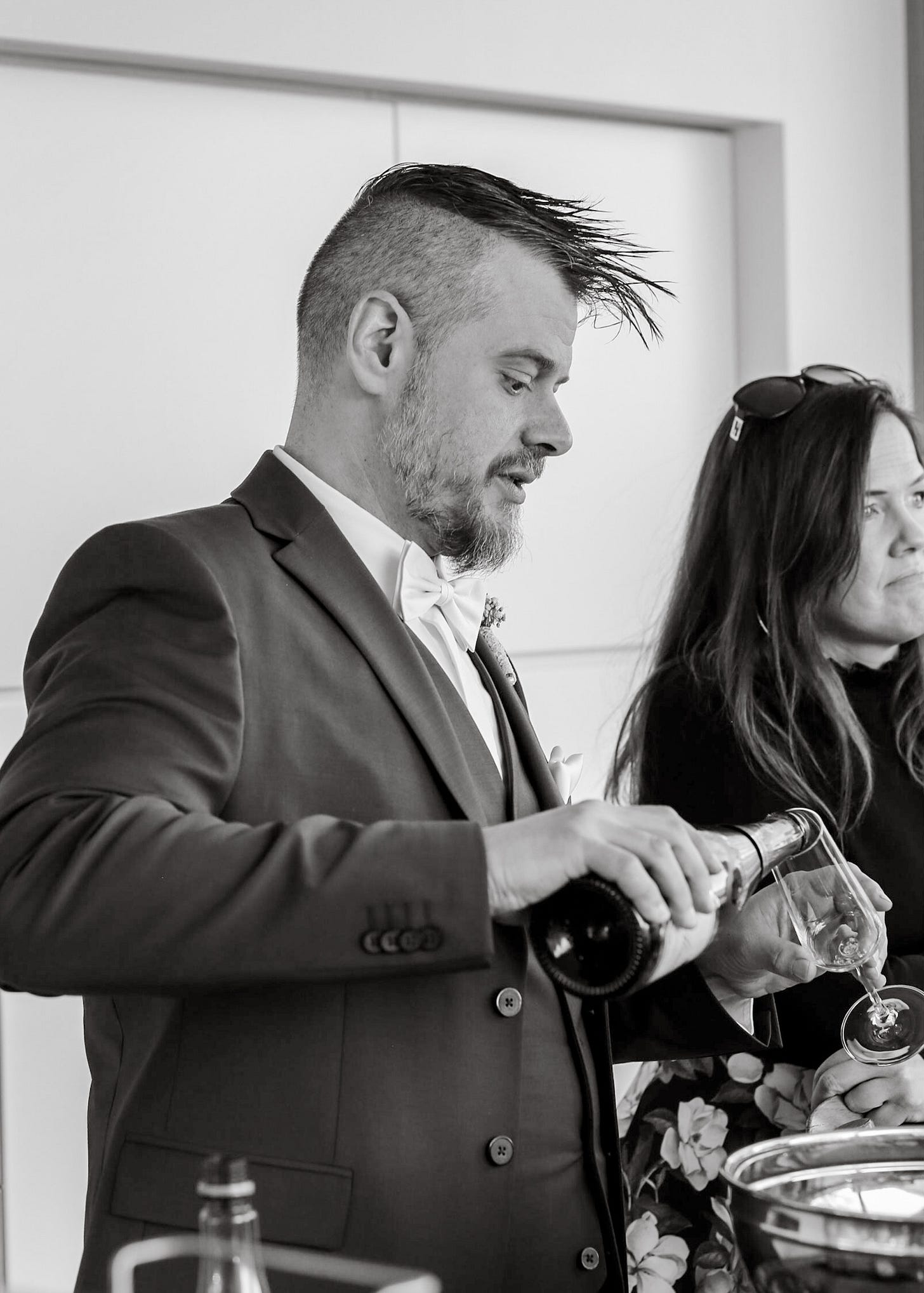
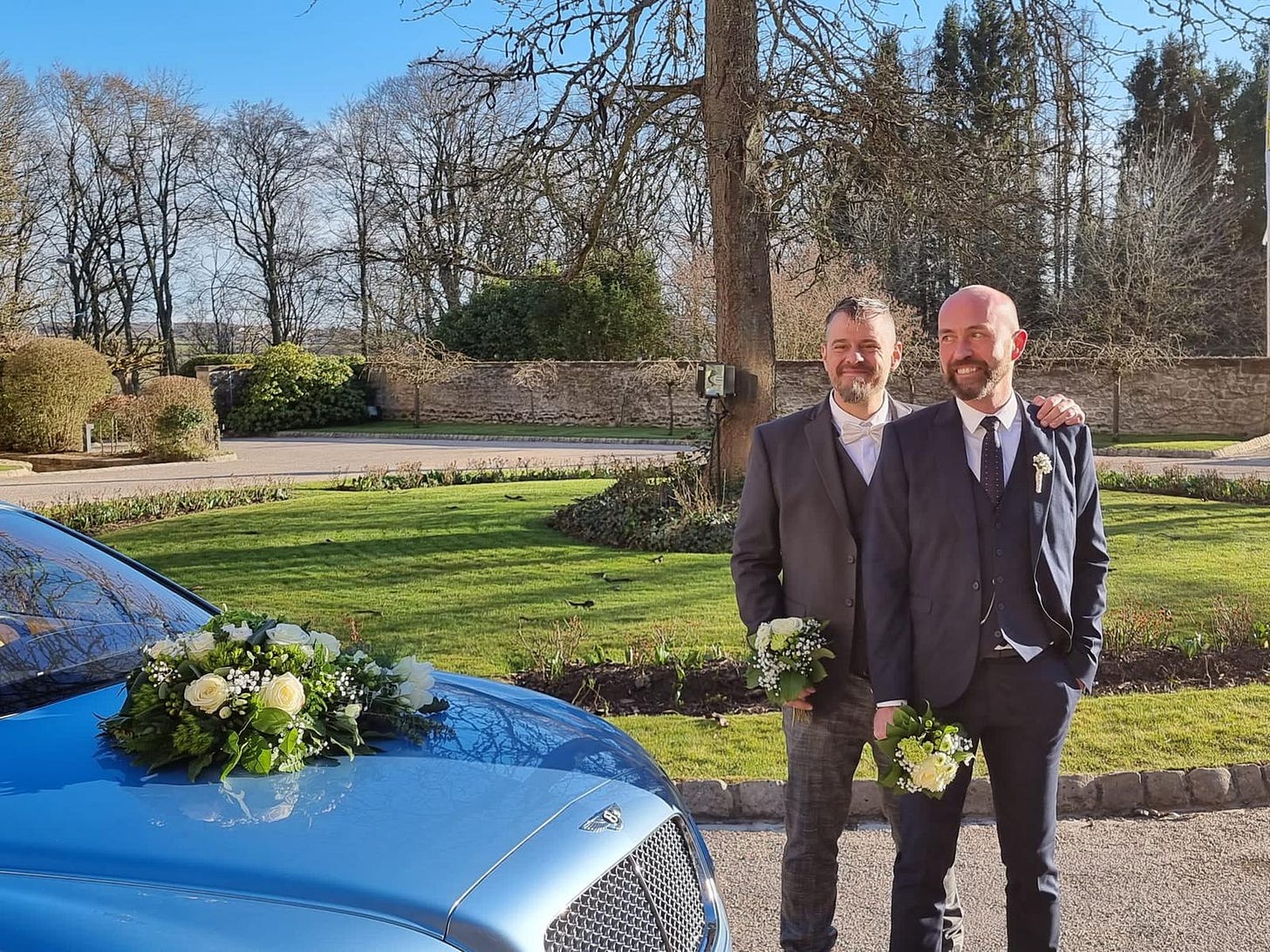
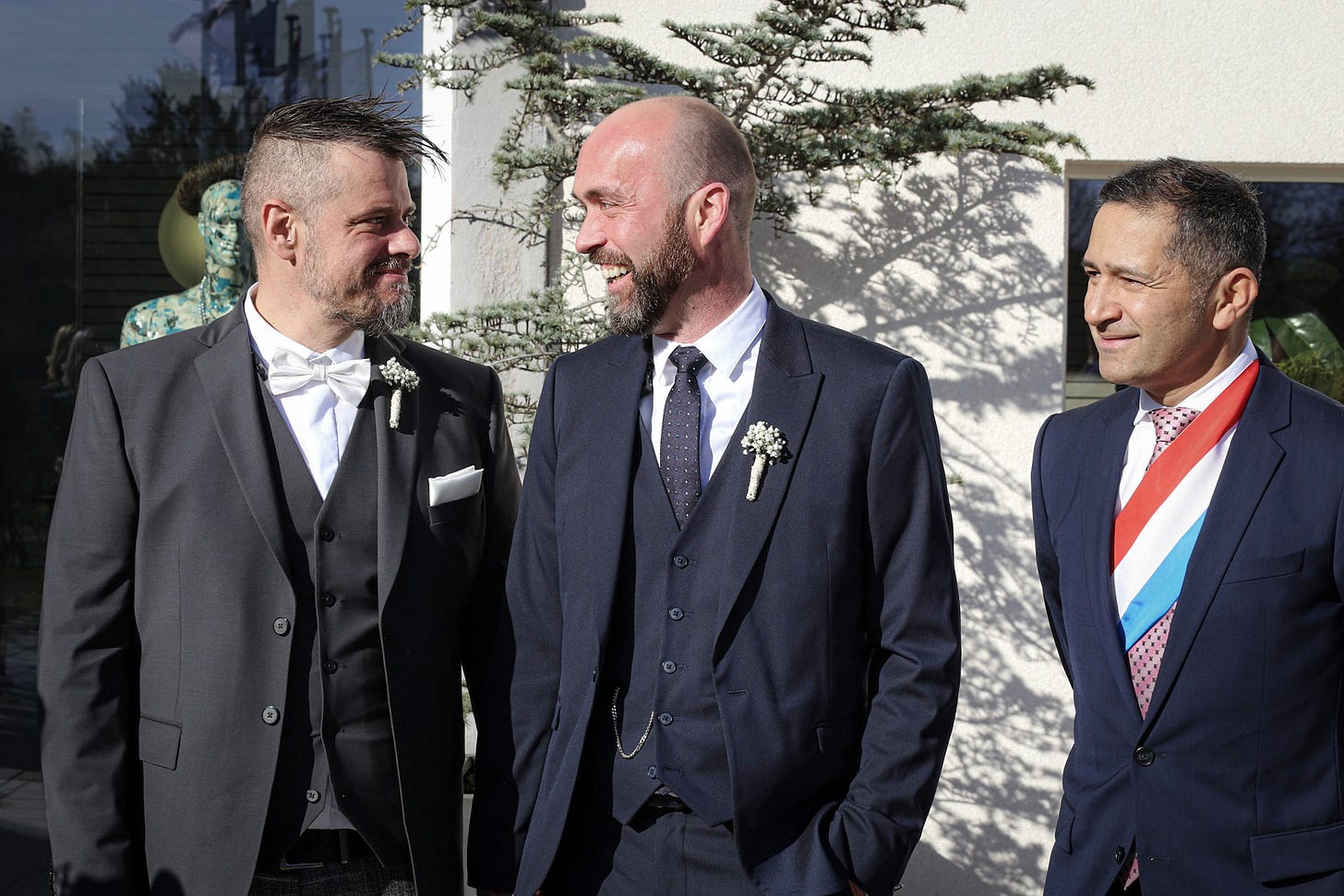
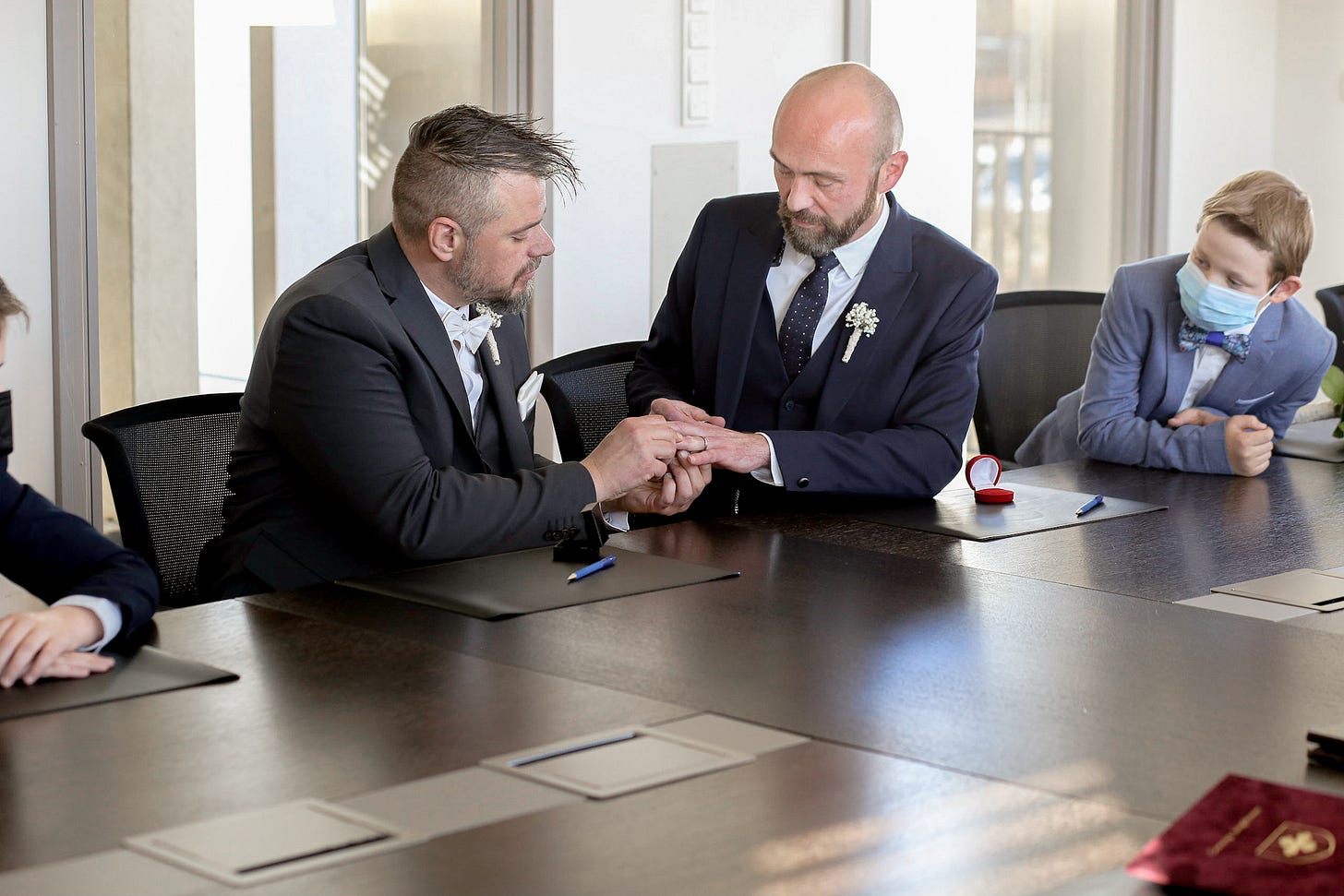
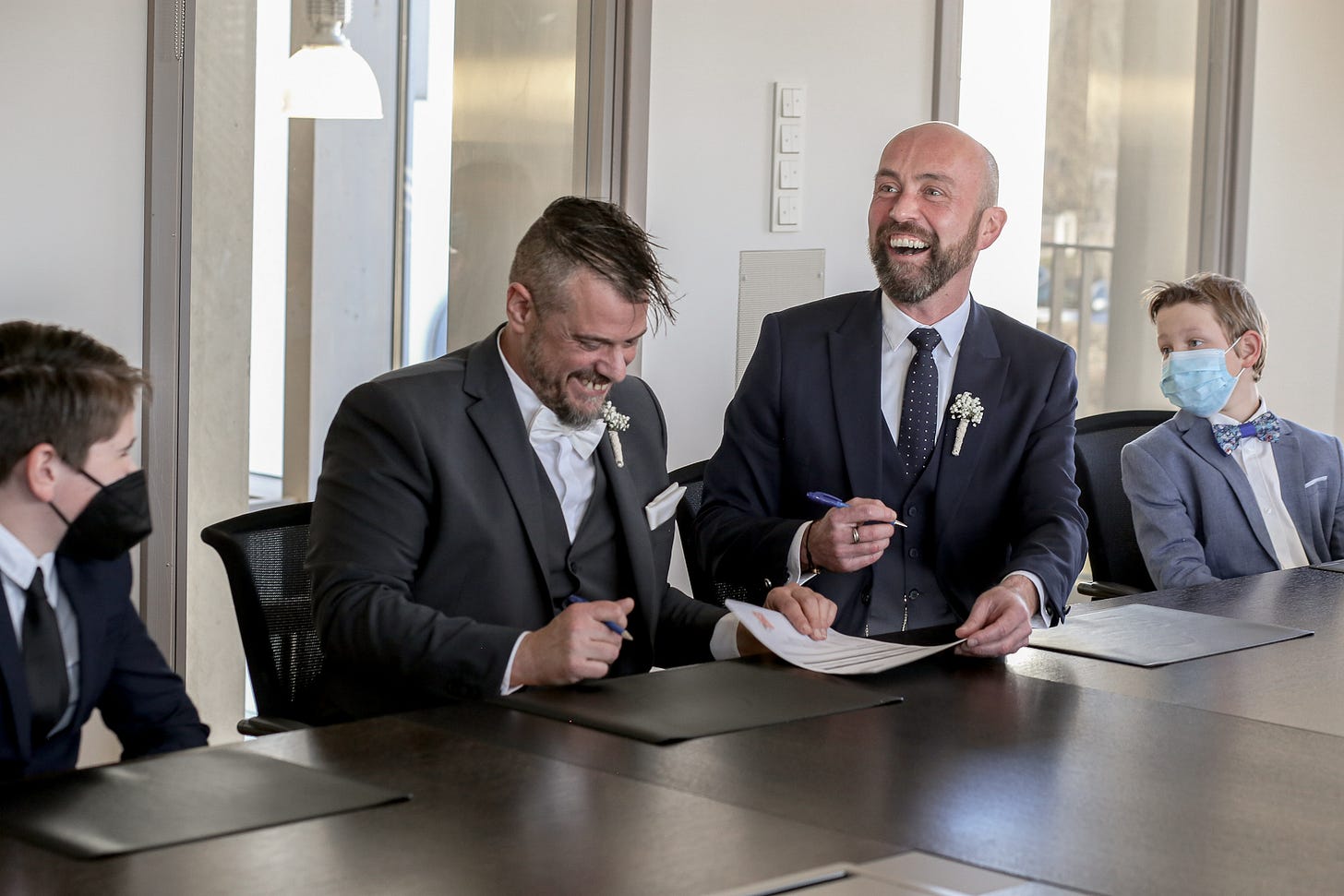
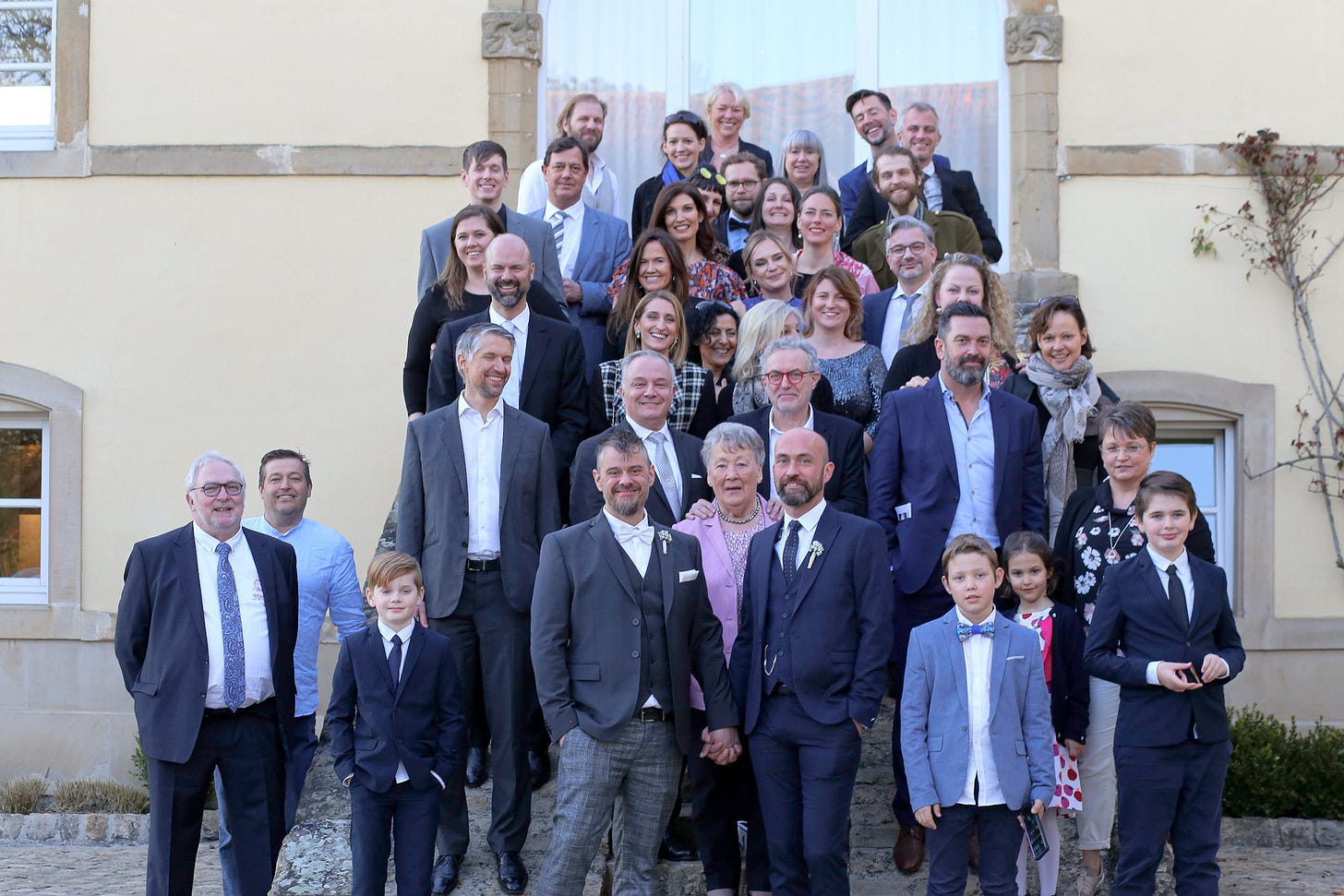

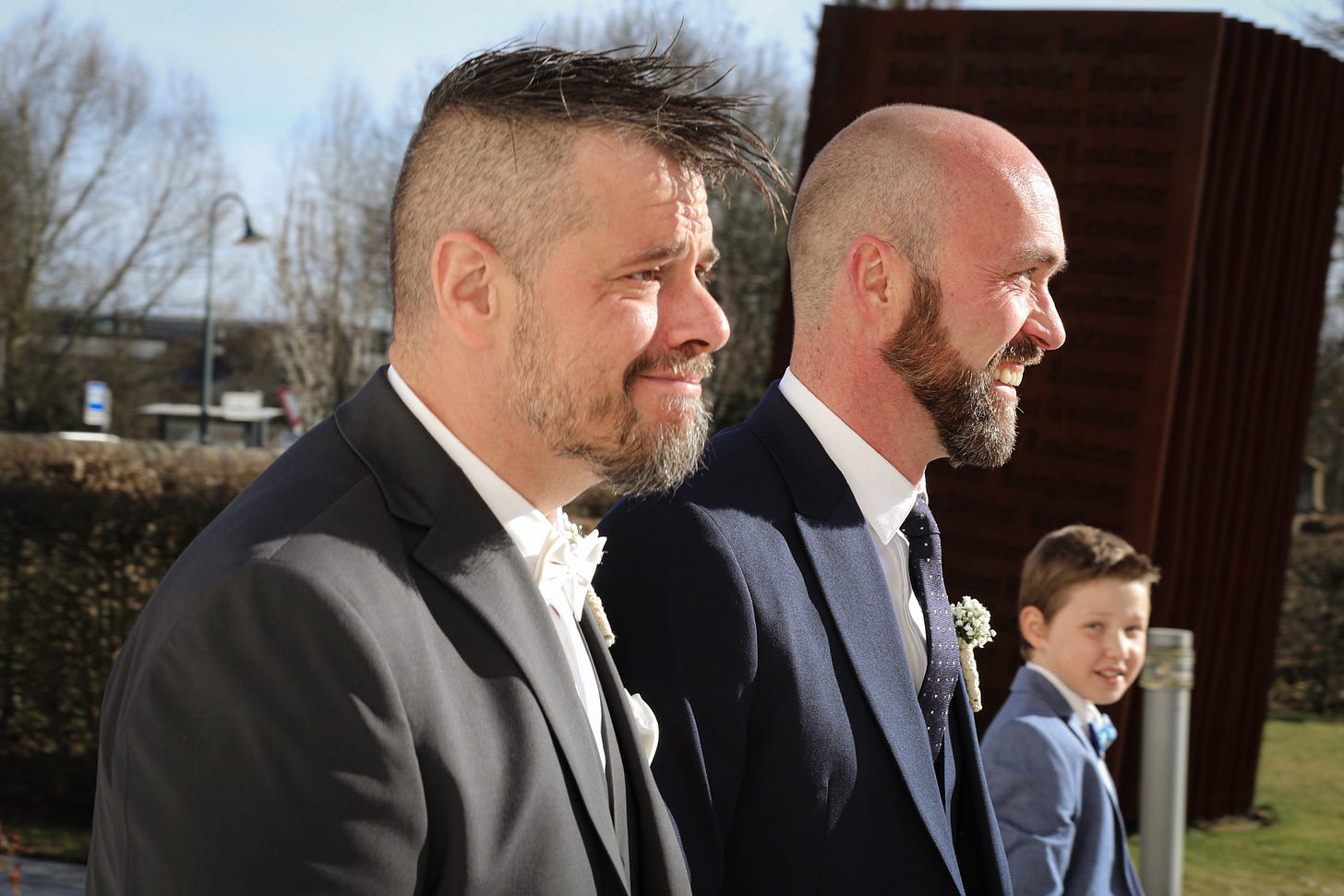
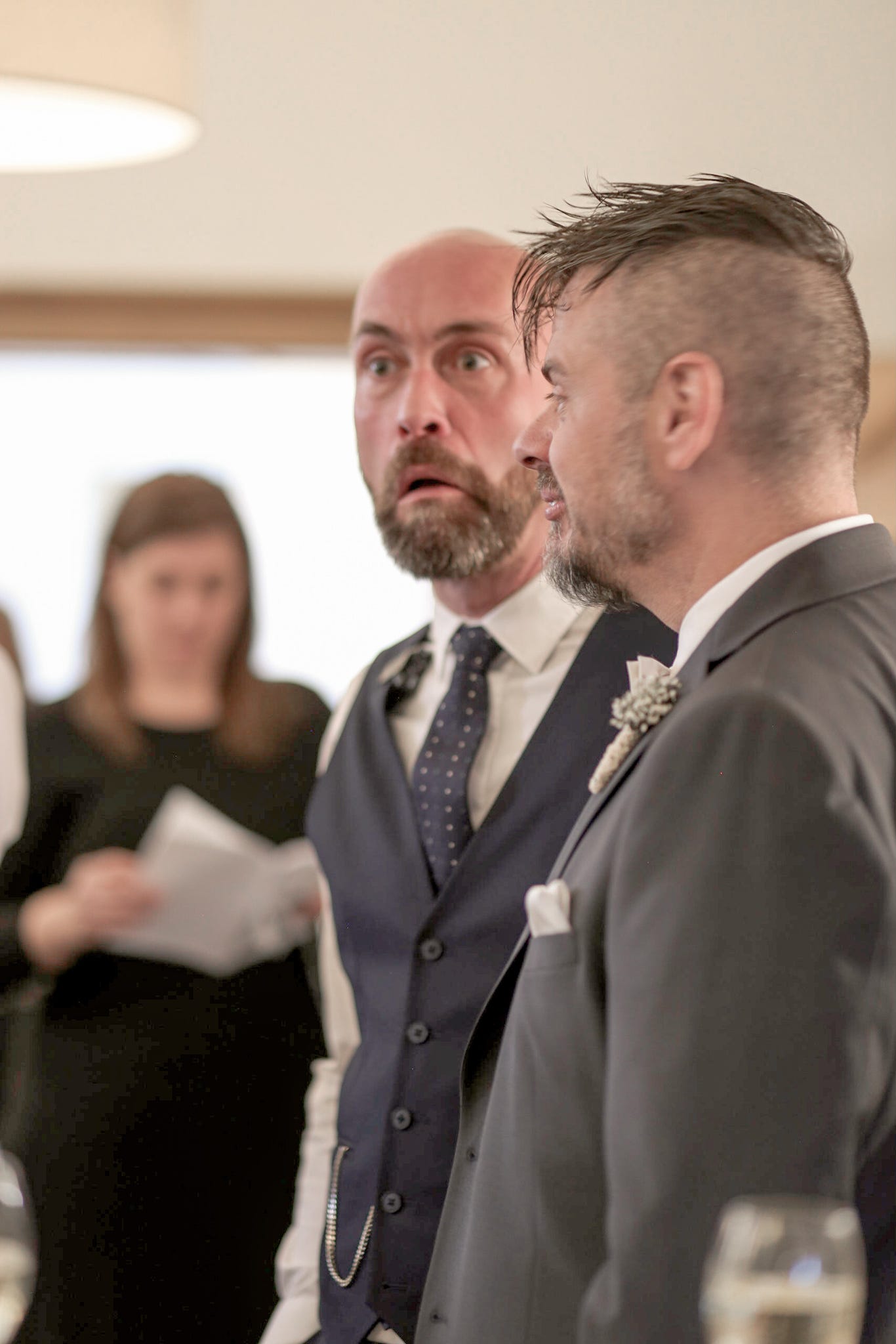
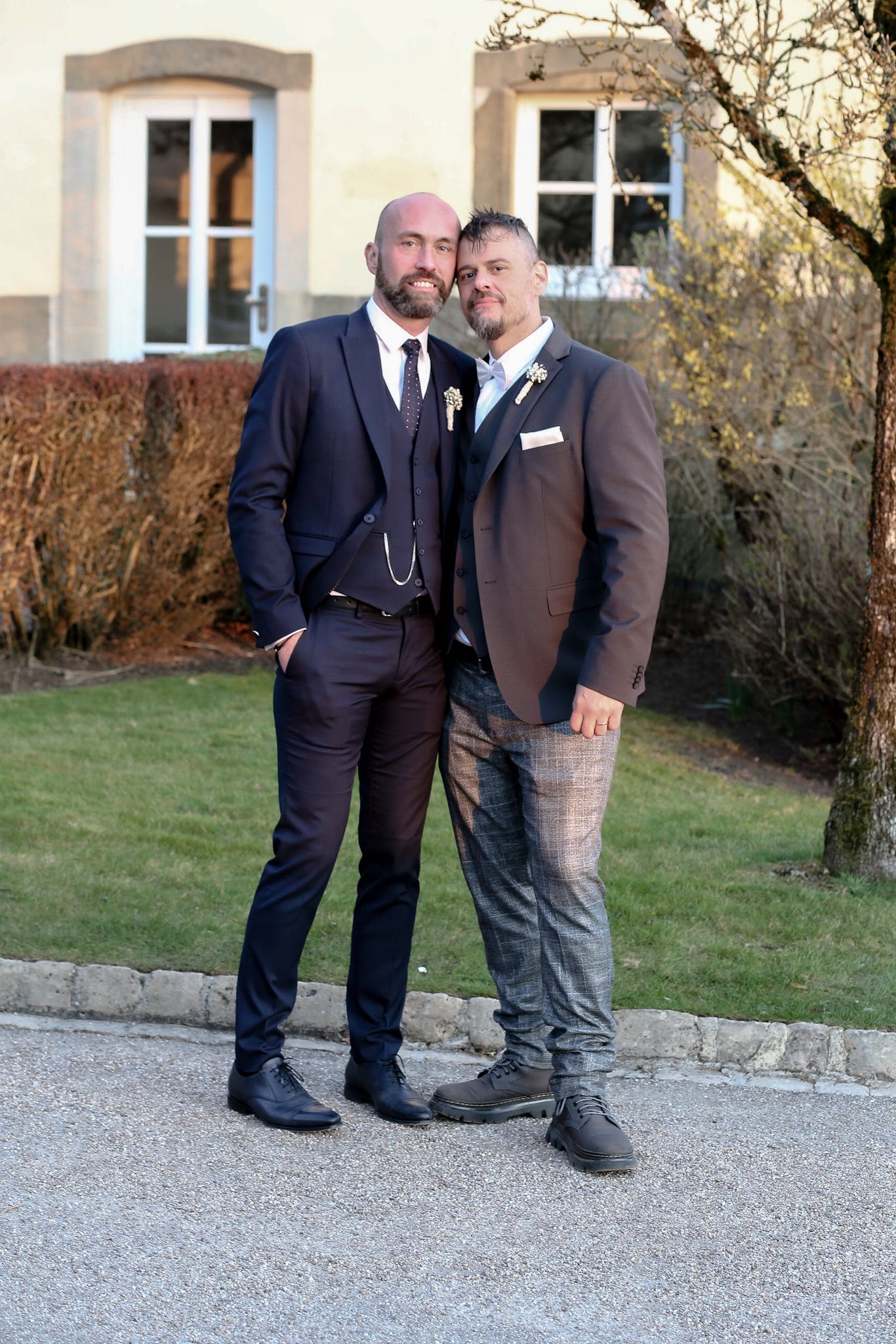
Congratulations! What a beautiful wedding.
I've been married 12 years. My thoughts on marriage is that it is the simplest and most primitive building block of community. My community and my family are shattered and broken. So are my husband's. But we build a new family. Marriage is in part a proof that each generation has a new chance. That relationships are worthwhile and that we can endlessly adjust to be kind to each other. The fault in marriage was always in the sacrifice of humanity to tradition- the subordination of women or the persecution of gays were the old pushing forward their mistakes and baggage onto the young. There's a place for both tradition and for humanity. What could be an older tradition than pair bonding? But each couple has to figure out for themselves how to make a marriage work and so each marriage is new. Congratulations again. Have fun building the marriage. Sounds like you've got a strong foundation.
You so deserve this happiness. It brings me happiness witnessing yours!